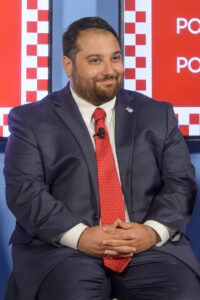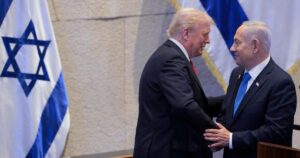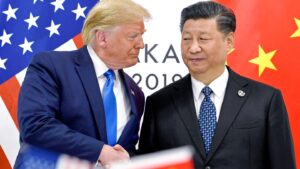The Dictatorship
Unlawful combatants in Caribbean…
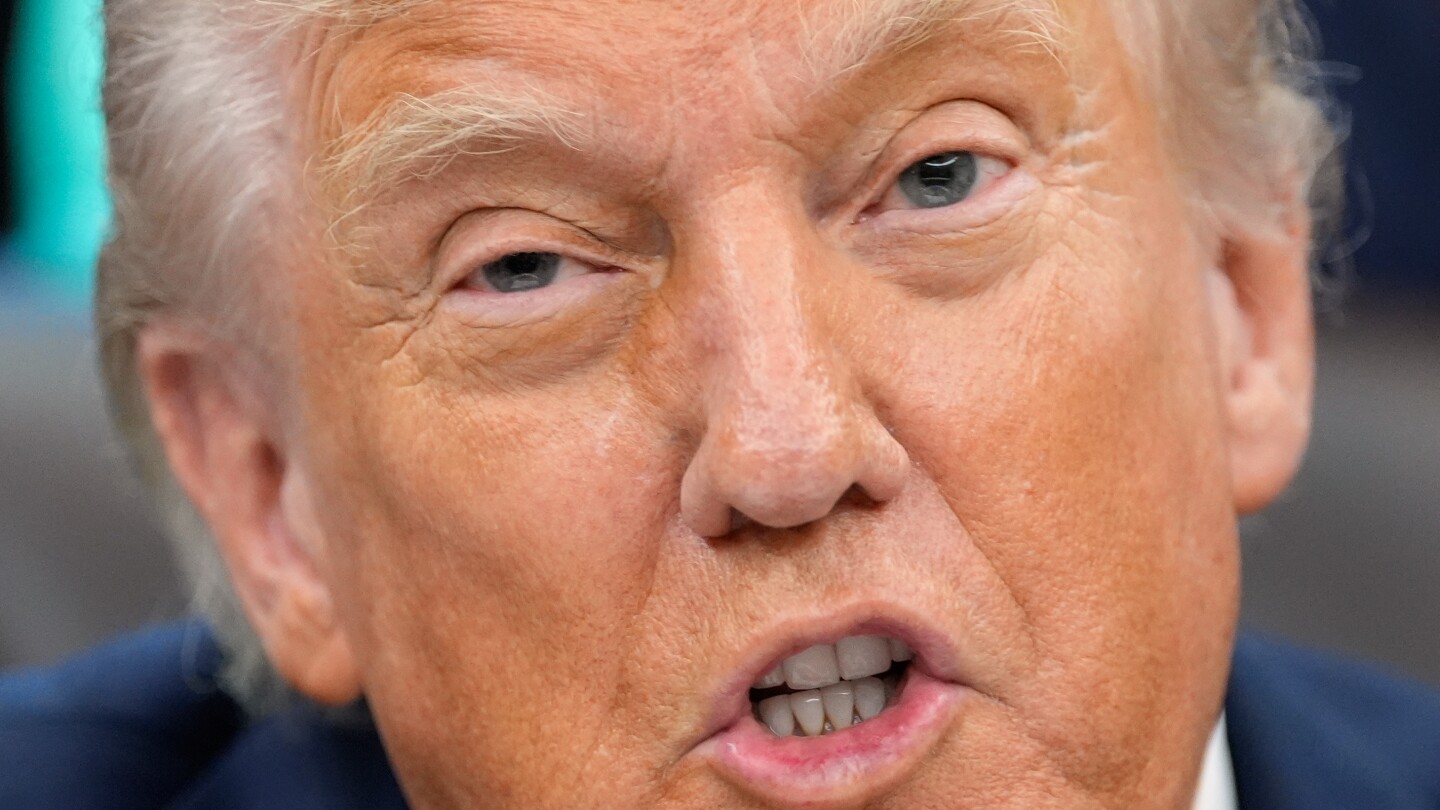
WASHINGTON (AP) — President Donald Trump has declared drug cartels to be unlawful combatants and says the United States is now in an “armed conflict” with them, according to a Trump administration memo obtained by The Associated Press on Thursday, following recent U.S. strikes on boats in the Caribbean.
The memo appears to represent an extraordinary assertion of presidential war powerswith Trump effectively declaring that trafficking of drugs into the United States amounts to armed conflict requiring the use of military force — a new rationale for past and future actions.
“The President determined that the United States is in a non-international armed conflict with these designated terrorist organizations,” the memo says. Trump directed the Pentagon to “conduct operations against them pursuant to the law of armed conflict.”
“The United States has now reached a critical point where we must use force in self-defense and defense of others against the ongoing attacks by these designated terrorist organizations,” the memo says.
Besides signaling a potential new moment in Trump’s stated “America First” agenda that favors non-intervention overseas, the declaration raises stark questions about how far the White House intends to use its war powers and if Congress will exert its authority to approve — or ban — such military actions.
“The United States is taking a much more dramatic step — one that I think is a very, very far stretch of international law and a dangerous one,” said Matthew Waxman, who was a national security official in the George W. Bush administration. It “means the United States can target members of those cartels with lethal force. It means the United States can capture and detain them without trial.”
Declaration follows boat strikes in the Caribbean
The U.S. military last month carried out three deadly strikes against boats in the Caribbean that the administration accused of ferrying drugs. At least two of those operations were carried out on vessels that originated from Venezuela.
Those strikes followed up a buildup of U.S. maritime forces in the Caribbean unlike any seen in recent times. The Navy’s presence in the region — eight warships with over 5,000 sailors and Marines — has been pretty stable for weeks, according to two defense officials, who spoke on condition of anonymity to discuss ongoing operations.
The memo did not include a timestamp, but it references a Sept. 15 U.S. strike that “resulted in the destruction of the vessel, the illicit narcotics, and the death of approximately 3 unlawful combatants.”
“As we have said many times, the President acted in line with the law of armed conflict to protect our country from those trying to bring deadly poison to our shores, and he is delivering on his promise to take on the cartels and eliminate these national security threats from murdering more Americans,” the White House said.
Pentagon officials briefed senators on the strikes Wednesday, according to a person familiar with the matter, who was not authorized to comment publicly and spoke on the condition of anonymity. The Pentagon referred questions to the White House.
From AP’s Standards and Stylebook teams:
The AP is using anonymous sourcing to provide information for this story. Click here to hear Washington Bureau Chief Anna Johnson explain AP’s policy on the use of anonymous sources.
What the Trump administration laid out at the classified briefing at the Capitol was perceived by several senators as pursuing a new legal framework that raised questions particularly regarding the role of Congress in authorizing any such action, that person said.
Pentagon officials also briefed House staffers last week on the strikes, according to another person who was briefed on the meeting and similarly spoke on condition of anonymity.
The memo, which was reported earlier by The New York Times, lays out a rationale seen both as the administration’s justification for the military strikes it has already taken on the boats in the Caribbean — which have raised concerns from lawmakers as potentially unlawful — as well as any action to come.
A White House official who wasn’t authorized to comment publicly and spoke on condition of anonymity said the memo was sent to Congress on Sept. 18 and does not convey any new information. The person familiar with the Senate briefing said it was transmitted this week.
Details weren’t given on the cartels targeted
Trump has designated several Latin American drug cartels as foreign terrorist organizationsand the administration had previously justified the military action as a necessary escalation to stem the flow of drugs into the United States.
Pentagon officials could not provide a list of the designated terrorist organizations at the center of the conflict, a matter that was a major source of frustration for some of the lawmakers who were briefed this week, according to one of the people familiar with the briefings.
While “friendly foreign nations have made significant efforts to combat these organizations,” the memo said, the groups “are now transnational and conduct ongoing attacks throughout the Western Hemisphere as organized cartels.” The memo refers to cartel members as “unlawful combatants.”
The Trump administration is trying to justify the use of military force against drug cartels in the same way the Bush administration justified the war against al-Qaida following the Sept. 11 attacks, said Waxman, who served in the State and Defense Departments and on the National Security Council under Bush.
Bush, however, had authorization from Congress, unlike Trump. The Trump administration is arguing that it no longer has to consider the individual circumstances of using force, said Waxman, who now chairs Columbia Law School’s National Security Law Program.
“It’s basically saying, ‘We don’t have to engage in that kind of case-by-case decision-making,’” Waxman said. “All of these vessels that are carrying enemy personnel can be targeted, whether they’re headed towards the United States or not.”
Waxman said he expects more strikes and “we’ll see if the United States takes the next big step and engages in lethal force or armed force on the territory of another state.”
Lawmakers of both major political parties have pressed Trump to seek war powers authority from Congress for operations against alleged drug traffickers. Several senators and human rights groups have questioned the legality of the strikes, calling them potential overreach of executive authority in part because the military was used for law enforcement purposes.
Sen. Jack Reed of Rhode Island, the top Democrat on the Senate Armed Services Committee, said drug cartels are “despicable” but the Trump administration has offered “no credible legal justification, evidence or intelligence for these strikes.”
Reed, a former Army officer, said “every American should be alarmed that their President has decided he can wage secret wars against anyone he calls an enemy.”
___
Associated Press writers Konstantin Toropin, Ben Finley and Michelle L. Price contributed to this report.
The Dictatorship
Trump urges Israel to seize chance for peace ahead of Egypt summit and presses for Netanyahu pardon
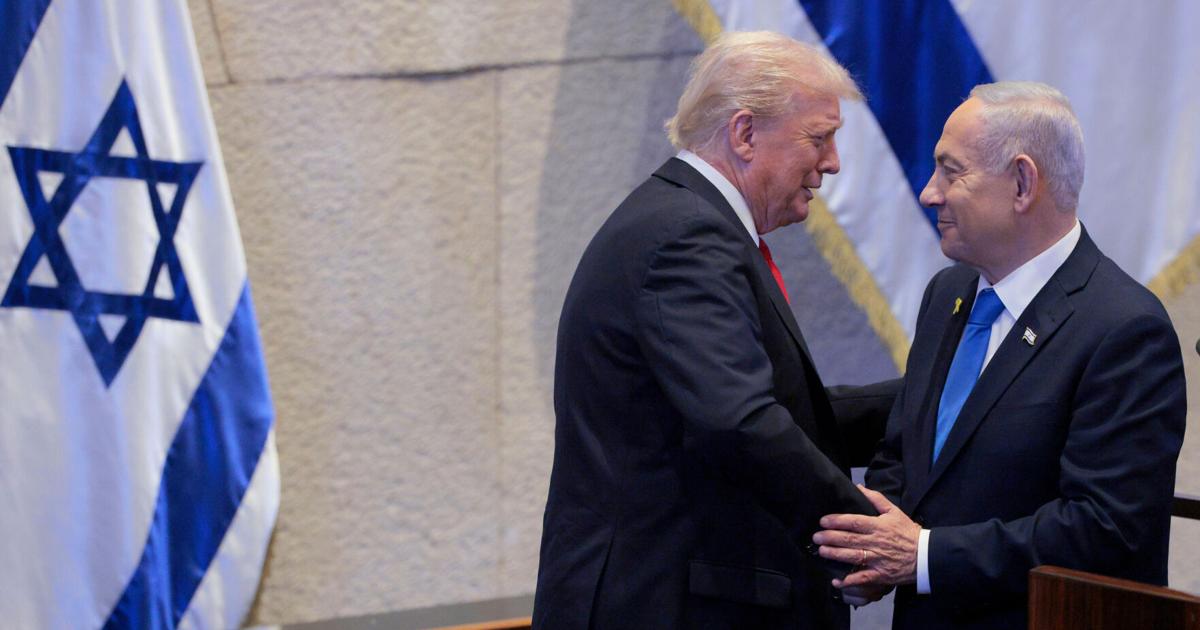
SHARM EL SHEIKH, Egypt (AP) — President Donald Trump called for a new era of harmony in the Middle East on Monday during a global summit on Gaza’s futuretrying to advance broader peace in the region after visiting Israel to celebrate a U.S.-brokered ceasefire with Hamas.
“We have a once-in-a-lifetime chance to put the old feuds and bitter hatreds behind us,” Trump said, and he urged leaders “to declare that our future will not be ruled by the fights of generations past.”
The whirlwind trip, which included the summit in Egypt and a speech at the Knesset in Jerusalem earlier in the day, comes at a fragile moment of hope for ending two years of war between Israel and Hamas.
“Everybody said it’s not possible to do. And it’s going to happen. And it is happening before your very eyes,” Trump said alongside Egyptian President Abdel Fattah el-Sissi.
Nearly three dozen countries, including some from Europe and the Middle East, were represented at the summit. Israeli Prime Minister Benjamin Netanyahu was invited but declined, with his office saying it was too close to a Jewish holiday.
Trump, el-Sissi, Turkish President Recep Tayyip Erdogan and Qatari Emir Tamim bin Hamad Al Thani signed a document outlining a broad vision that Trump said would lay the groundwork for Gaza’s future.
Despite unanswered questions about next steps in the Palestinian enclave, which has been devastated during the conflictTrump is determined to seize an opportunity to chase an elusive regional harmony.
He expressed a similar sense of finality about the Israel-Hamas war in his speech at the Knesset, which welcomed him as a hero.
“You’ve won,” he told Israeli lawmakers. “Now it is time to translate these victories against terrorists on the battlefield into the ultimate prize of peace and prosperity for the entire Middle East.”
Trump promised to help rebuild Gaza, and he urged Palestinians to “turn forever from the path of terror and violence.”
“After tremendous pain and death and hardship,” he said, “now is the time to concentrate on building their people up instead of trying to tear Israel down.”
Trump even made a gesture to Iran, where he bombed three nuclear sites during the country’s brief war with Israel earlier this year, by saying “the hand of friendship and cooperation is always open.”
Trump’s whirlwind trip
Trump arrived in Egypt hours late because speeches at the Knesset continued longer than expected.
“They might not be there by the time I get there, but we’ll give it a shot,” Trump joked after needling Israeli leaders for talking so much.
Twenty hostages were released Monday as part of an agreement intended to end the war that began on Oct. 7, 2023, with an attack by Hamas-led militants. Trump talked with some of their families at the Knesset.
“Your name will be remembered to generations,” a woman told him.
Israeli lawmakers chanted Trump’s name and gave him standing ovation after standing ovation. Some people in the audience wore red hats that resembled his “Make America Great Again” caps, although these versions said “Trump, The Peace President.”
Netanyahu hailed Trump as “the greatest friend Israel has ever had in the White House,” and he promised to work with him going forward.
“Mr. President, you are committed to this peace. I am committed to this peace,” he said. “And together, Mr. President, we will achieve this peace.”
Trump, in an unexpected detour during his speech, called on the Israeli president to pardon Netanyahu, whom he described as “one of the greatest” wartime leaders. Netanyahu faces corruption chargesalthough several hearings have been postponed during the conflict with Hamas.
The Republican president also used the opportunity to settle political scores and thank his supporters, criticizing Democratic predecessors and praising a top donor, Miriam Adelsonin the audience.
Trump pushes to reshape the region
The moment remains fragile, with Israel and Hamas still in the early stages of implementing the first phase of Trump’s plan.
The first phase of the ceasefire agreement calls for the release of the final hostages held by Hamas; the release of hundreds of Palestinian prisoners held by Israel; a surge of humanitarian aid to Gaza; and a partial pullback by Israeli forces from Gaza’s main cities.
Trump has said there’s a window to reshape the region and reset long-fraught relations between Israel and its Arab neighbors.
“The war is over, OK?” Trump told reporters traveling with him aboard Air Force One.
“I think people are tired of it,” he said, emphasizing that he believed the ceasefire would hold because of that.
He said the chance of peace was enabled by his Republican administration’s support of Israel’s decimation of Iranian proxies, including Hamas in Gaza and Hezbollah in Lebanon.
The White House said momentum is also building because Arab and Muslim states are demonstrating a renewed focus on resolving the broader, decades-long Israeli-Palestinian conflict and, in some cases, deepening relations with the United States.
In February, Trump had predicted that Gaza could be redeveloped into what he called “the Riviera of the Middle East.” But on Sunday aboard Air Force One, he was more circumspect.
“I don’t know about the Riviera for a while,” Trump said. “It’s blasted. This is like a demolition site.” But he said he hoped to one day visit the territory. “I’d like to put my feet on it, at least,” he said.
The sides have not agreed on Gaza’s postwar governance, the territory’s reconstruction and Israel’s demand that Hamas disarm. Negotiations over those issues could break down, and Israel has hinted it may resume military operations if its demands are not met.
Much of Gaza has been reduced to rubbleand the territory’s roughly 2 million residents continue to struggle in desperate conditions. Under the deal, Israel agreed to reopen five border crossings, which will help ease the flow of food and other supplies into Gaza, parts of which are experiencing famine.
Roughly 200 U.S. troops will help support and monitor the ceasefire deal as part of a team that includes partner nations, nongovernmental organizations and private-sector players.
___
Megerian reported from Washington. Associated Press writers Will Weissert and Seung Min Kim in Washington contributed to this report.
___
Follow the AP’s coverage of the Israel-Hamas war at https://apnews.com/hub/israel-hamas-war.
The Dictatorship
Naked bike riders demonstrate against troops in Portland…

PORTLAND, Ore. (AP) — Protesters rallying against the Trump administration in Portland put the city’s quirky and irreverent reputation on display Sunday by pedaling through the streets wearing absolutely nothing — or close to it — in an “emergency” edition of the annual World Naked Bike Ride.
Crowds that have gathered daily and nightly outside the immigration facility in Oregon’s largest city in recent days have embraced the absurd, donning inflatable frog, unicorn, axolotl and banana costumes as they face off with federal law enforcement who often deploy tear gas and pepper balls.
The bike ride is an annual tradition that usually happens in the summer, but organizers of this weekend’s hastily called event said another nude ride was necessary to speak out against President Donald Trump’s attempts to mobilize the National Guard to quell protests.
Rider Janene King called the nude ride a “quintessentially Portland way to protest.”
The 51-year-old was naked except for wool socks, a wig and a hat. She sipped hot tea and said she was unbothered by the steady rain and temperatures in the mid-50s (about 12 Celsius).
“We definitely do not want troops coming into our city,” King said.
Bike riders made their way through the streets and to the city’s U.S. Immigration and Customs Enforcement building. Authorities there ordered people to stay out of the street and protest only on sidewalks or risk being arrested.
The city is awaiting the ruling of an appeals court panel on whether Trump can send out the federalized troops after a federal judge on Oct. 5 ordered a temporary hold on deployment.
“Joy is a form of protest. Being together with mutual respect and kindness is a form of protest,” the ride’s organizers said on Instagram. “It’s your choice how much or little you wear.”
Fewer people were fully naked than usual — likely because of the cool, wet weather — but some still bared it all and rode wearing only bike helmets.
Naked bike rides have thronged the streets of Oregon’s largest city every year since 2004, often holding up traffic as the crowd cycles through with speakers playing music. Some years have drawn roughly 10,000 riders, according to Portland World Naked Bike Ride.
___
Weber reported from Los Angeles.
The Dictatorship
China calls for US to withdraw tariff threat
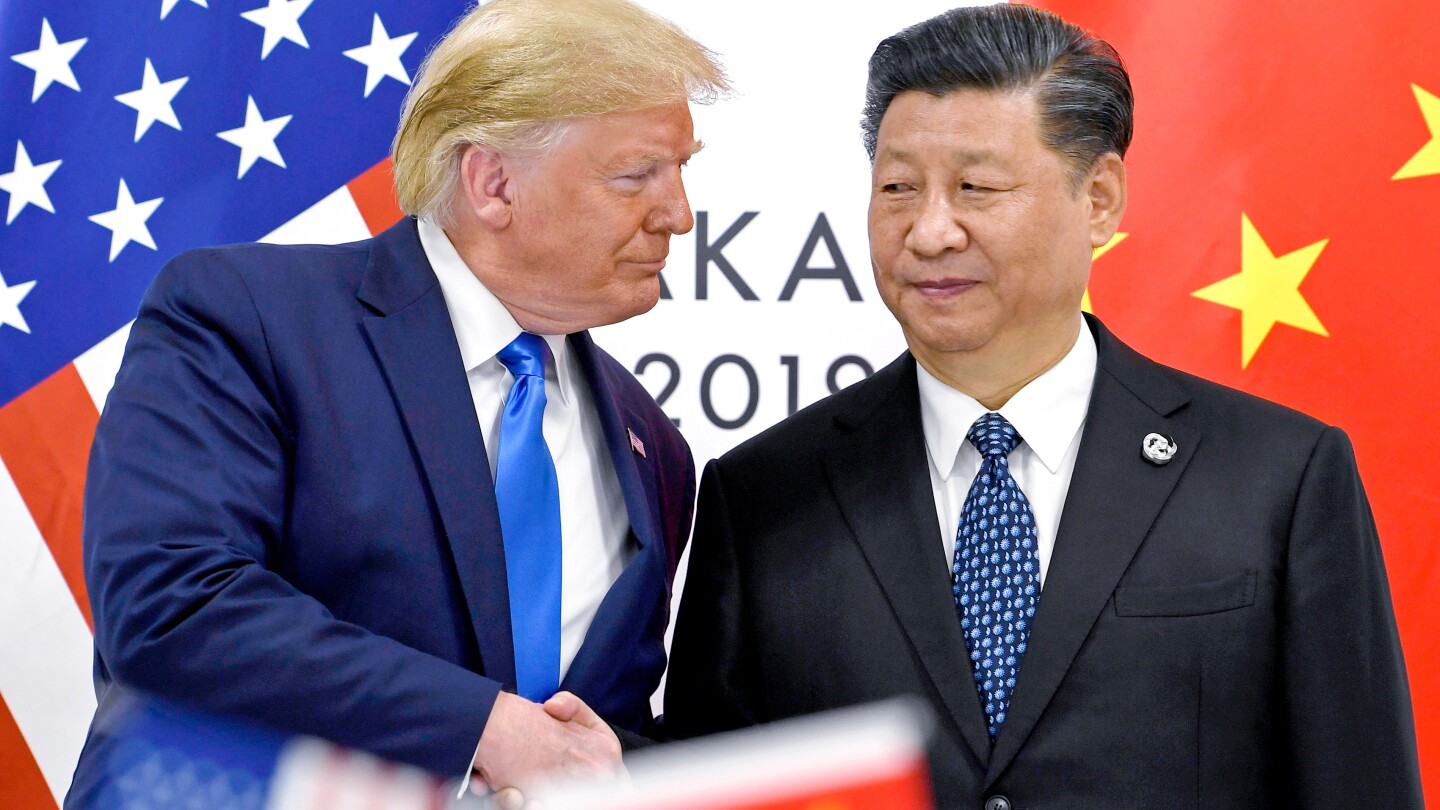
BANGKOK (AP) — China did not back down Monday in a back-and-forth with the U.S. over trade, calling for U.S. President Donald Trump to withdraw his latest threat of a 100% tariff and other export control measures announced over the weekend.
In the latest escalation of the trade war between the two nations, Trump issued the tariff threat on all Chinese imports into the U.S. after China placed stricter restrictions Thursday on rare earths, a vital resource used in electronics.
The Chinese announcement was an apparent surprise to Trump, who called it an “out of the blue” move. While Trump did not withdraw the economic threat, he sounded more conciliatory than in the past, saying in a Truth Social post Sunday, “The U.S.A. wants to help China, not hurt it!!!”
China’s Ministry of Commerce issued a lengthy response Sunday saying the U.S. was “severely damaging the atmosphere of trade negotiations.”
“China urges the U.S. to promptly correct its erroneous practices,” Chinese Ministry of Foreign Affairs spokesman Lin Jian said Monday. “If the U.S. insists on going its own way, China will certainly take resolute measures to safeguard its legitimate rights and interests.”
Both nations have leveraged multiple dimensions of the trade relationship in the trade war, with actions ranging from U.S. restrictions on China’s ability to import advanced computer chips, China ending purchases of American soybeans and an exchange of tit-for-tat port fees.
Economic indicators show the retaliatory actions and uncertainty are impacting trade between the countries. Chinese trade data release Monday showed exports to the U.S. have fallen for six straight months, dropping 27% in September from the year before.
-
Uncategorized11 months ago
Bob Good to step down as Freedom Caucus chair this week
-

 Politics8 months ago
Politics8 months agoFormer ‘Squad’ members launching ‘Bowman and Bush’ YouTube show
-

 The Josh Fourrier Show11 months ago
The Josh Fourrier Show11 months agoDOOMSDAY: Trump won, now what?
-

 The Dictatorship8 months ago
The Dictatorship8 months agoPete Hegseth’s tenure at the Pentagon goes from bad to worse
-

 The Dictatorship8 months ago
The Dictatorship8 months agoLuigi Mangione acknowledges public support in first official statement since arrest
-

 Politics8 months ago
Politics8 months agoBlue Light News’s Editorial Director Ryan Hutchins speaks at Blue Light News’s 2025 Governors Summit
-

 Politics11 months ago
Politics11 months agoWhat 7 political experts will be watching at Tuesday’s debate
-

 Politics8 months ago
Politics8 months agoFormer Kentucky AG Daniel Cameron launches Senate bid


